
Archeologia e Calcolatori
Scope & Guideline
Inspiring Dialogues in Archaeology and Computational Research
Introduction
Aims and Scopes
- Digital Archaeology and Methodologies:
The journal consistently publishes research on the use of digital tools and methodologies in archaeology, including 3D modeling, GIS, and photogrammetry, facilitating new ways to document and analyze archaeological sites. - Cultural Heritage Preservation:
A significant focus is on the preservation and documentation of cultural heritage, exploring how modern technologies can aid in the conservation and interpretation of archaeological findings. - Community Engagement and Participatory Projects:
The journal highlights projects that involve community participation in archaeological research, showcasing collaborative approaches to heritage management and public archaeology. - Interdisciplinary Research:
There is a strong emphasis on interdisciplinary studies, integrating fields such as history, architecture, and environmental science to enrich archaeological research and understanding. - Sustainability and Ethical Practices:
The journal addresses sustainability in archaeological practices, discussing ethical considerations in fieldwork, data management, and the use of technology.
Trending and Emerging
- 3D Modeling and Virtual Reality:
Recent publications have increasingly focused on 3D modeling and virtual reality applications, enhancing the visualization and interaction with archaeological data, which is crucial for both research and public engagement. - Machine Learning and AI in Archaeology:
There is a growing trend in utilizing machine learning and artificial intelligence for data analysis in archaeology, enabling researchers to process large datasets and uncover patterns in archaeological findings. - GIS and Spatial Analysis:
The use of Geographic Information Systems (GIS) for spatial analysis in archaeological research is on the rise, allowing for more sophisticated interpretations of spatial relationships and landscape use. - Augmented Reality and Interactive Exhibits:
Emerging themes include the integration of augmented reality in museum exhibits and archaeological sites, enhancing visitor experiences and educational outreach. - Sustainable Archaeological Practices:
There is an increasing focus on sustainable practices within archaeological research, including discussions about the impact of archaeological activities on environments and communities.
Declining or Waning
- Traditional Archaeological Techniques:
There appears to be a waning interest in purely traditional excavation and survey methods, as the journal shifts towards more technologically advanced approaches, such as digital documentation and analysis. - Historical Artifact Studies:
Research focused solely on the study of individual artifacts without the integration of digital methodologies is becoming less common, indicating a move towards more holistic and technology-driven analyses. - Generalized Archaeological Theory:
Papers that discuss broad theoretical frameworks without specific applications or case studies are less frequent, suggesting a preference for practical, data-driven research that applies theory within specific contexts.
Similar Journals

Bulgarsko e-Spisanie za Arkheologiya-Bulgarian e-Journal of Archaeology
Exploring the depths of Bulgaria's archaeological wonders.Bulgarsko e-Spisanie za Arkheologiya - Bulgarian e-Journal of Archaeology is a prominent open-access journal published by the ASSOC BULGARIAN ARCHAEOLOGISTS since 2011, serving as a vital platform for the dissemination of archaeological research and findings in Bulgaria and beyond. With the ISSN 1314-5088, this journal is dedicated to advancing knowledge in the field of archaeology, facilitating the sharing of innovative studies, fieldwork results, and theoretical discussions. It is particularly significant for researchers, professionals, and students who are interested in the archaeological heritage of Bulgaria, providing an accessible venue for high-quality scholarly contributions. The journal's commitment to open access ensures that its rich repository of knowledge is available to a global audience, enhancing collaboration and fostering new discoveries within the discipline.
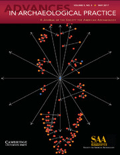
Advances in Archaeological Practice
Innovating the Future of ArchaeologyAdvances in Archaeological Practice, published by Cambridge University Press, is a leading journal in the field of archaeology, emphasizing innovative approaches and methodologies that advance archaeological research. With an ISSN of 2326-3768 and a commendable Q1 ranking in both the Arts and Humanities and Social Sciences categories, the journal effectively bridges theoretical perspectives and practical applications, positioning itself at the forefront of archaeological scholarship. Researchers and professionals can benefit from its high-impact content, reflected in its 93rd percentile ranking in the field, making it an essential resource for those aiming to stay abreast of the latest insights and practices. Although it operates under a subscription model, the quality and relevance of its publications ensure it plays a crucial role in shaping the discourse within the archaeological community and beyond, facilitating access to cutting-edge research that enhances our understanding of past human activities.

Journal of Maritime Archaeology
Fostering Global Collaboration in Maritime StudiesThe Journal of Maritime Archaeology, published by Springer, is a premier scholarly platform dedicated to advancing the understanding of maritime cultural heritage and underwater archaeology. With an ISSN of 1557-2285, this journal has continuously contributed to the field since its inception in 2006 and is set to celebrate its evolution until 2024. Holding a distinguished position as a Q1 journal in the field of Archaeology (Arts and Humanities) as of 2023, it ranks impressively at #96 out of 413 journals in its category, placing it in the 76th percentile of its field. This journal aims to disseminate high-quality research that explores the interplay between maritime environments and human activities, showcasing innovative methodologies, historical narratives, and cultural analyses. Researchers, professionals, and students engaged in maritime studies will find this journal an invaluable resource for advancing knowledge and fostering international collaboration in this vital area of archaeology.
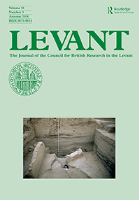
Levant
Pioneering Research at the Crossroads of TimeLevant is a prestigious academic journal published by Routledge Journals, Taylor & Francis Ltd, focusing on the fields of Archaeology and History. Since its inception in 1969, the journal has become a vital platform for researchers, professionals, and students interested in Middle Eastern studies, presenting high-quality research that reflects the rich cultural and historical tapestry of the Levant region. With an impressive impact factor and classified as Q1 in both Archaeology and History, Levant showcases innovative scholarship that pushes the boundaries of knowledge while maintaining rigorous academic standards. Although it is not an open-access journal, its articles are widely accessible through libraries and academic institutions, ensuring a broad reach for its impactful publications. With ongoing research converging from 1969 through to 2024, Levant remains a cornerstone for advancing academic discourse and exploration in relevant historical narratives.

Virtual Archaeology Review
Unlocking the Past with Innovative Virtual Techniques.Virtual Archaeology Review, published by UNIV POLITECNICA VALENCIA, EDITORIAL UPV, is a distinguished open-access journal dedicated to the dynamic fields of archaeology and conservation. Based in Spain, this journal has made a significant impact in the academic community, reflected in its outstanding Q1 ranking in Archeology and Conservation for 2023, alongside impressive standings in related disciplines such as Computer Science Applications. With an active commitment to promoting the accessibility of knowledge since 2010, it provides a platform for researchers, professionals, and students to share innovative findings and methodologies in virtual archaeology, fostering collaboration across disciplines. The journal's impact factor and its strategic focus on advancing the practice of virtual methodologies in archaeology underscore its vital role in bridging technology and heritage studies. By embracing a multidisciplinary approach, Virtual Archaeology Review not only enhances academic discourse but also drives the development of effective conservation strategies, making it an essential resource for those dedicated to the preservation and appreciation of our cultural heritage.
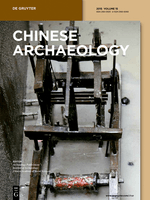
Chinese Archaeology
Uncovering the Depths of China's PastChinese Archaeology, published by WALTER DE GRUYTER GMBH, is a leading journal dedicated to the exploration and study of China's rich archaeological heritage. With an ISSN of 2160-5025 and an E-ISSN of 2160-5068, this journal serves as an essential platform for scholars, researchers, and enthusiasts in the field of archaeology, offering a blend of original research articles, reviews, and critical essays that address both contemporary issues and historical narratives. While it currently operates under a conventional access model, making cutting-edge research available to a select audience, it plays a crucial role in advancing knowledge about China's archaeological sites, artifacts, and past civilizations. Given the increasing interest in Eastern archaeology and its significance in a global context, Chinese Archaeology is positioned as a pivotal resource for understanding and interpreting the complexities of China’s historical evolution. Researchers and academics are encouraged to contribute and engage with this vital field of study to foster greater insights and innovations.
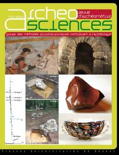
ArcheoSciences-Revue d Archeometrie
Fostering Interdisciplinary Insights in Archaeological ScienceArcheoSciences-Revue d Archeometrie is a prominent scholarly journal dedicated to the field of archaeology, published by PRESSES UNIV RENNES in France. With an ISSN of 1960-1360 and an E-ISSN of 2104-3728, this journal has gained recognition for its focus on the intersection of science and archaeological research, aiming to foster interdisciplinary dialogue and innovative methodologies within archaeological studies. Although coverage of the journal has been discontinued in Scopus post-2021, it has maintained a respectable standing with a Q3 Quartile ranking in both the Archaeology (Arts and Humanities) and Archaeology categories as of 2023, as well as commendable Scopus rankings in relevant fields. As an accessible platform for researchers, professionals, and students, ArcheoSciences offers valuable insights into applied techniques and findings in archaeological science, making it an essential resource for those involved in the historical and cultural analysis of material relics. Researchers are encouraged to explore this journal to stay informed about frontier research and ongoing discussions in the discipline.
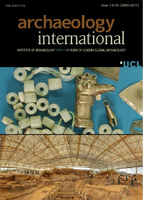
Archaeology International
Bridging disciplines to preserve our shared human heritage.Archaeology International is a prestigious open-access journal dedicated to advancing the field of archaeology since its inception in 1997. Published by UCL PRESS, the journal provides a platform for researchers, professionals, and students to disseminate their findings and share innovative ideas in archaeological studies. It features a rich array of articles that capture current trends, methodologies, and debates within the discipline, fostering a collaborative academic environment. Based in London, England, this journal is committed to accessibility and inclusivity, ensuring that valuable research is available to a global audience without subscription barriers. With a focus on interdisciplinary approaches, Archaeology International serves as an essential resource for those interested in the preservation of cultural heritage, and it actively encourages contributions that explore both past civilizations and contemporary archaeological practices.

California Archaeology
Revealing the Past: Insights from California's Archaeological LandscapeCalifornia Archaeology is a premier academic journal dedicated to the multifaceted study of archaeology within the context of California's rich historical and cultural landscape. Published by Routledge Journals, Taylor & Francis Ltd, this journal conveys cutting-edge research from 2009 to 2024 and is recognized for its impact in the field, with a commendable Q2 ranking in both archaeology and arts and humanities as of 2023. Scholars and practitioners are encouraged to disseminate their findings and insights through this journal, contributing to a deeper understanding of archaeological practices and interpretations in California. With access options designed to enhance the visibility of research, California Archaeology serves as an essential resource for professionals, students, and researchers devoted to advancing knowledge in archaeology, making it a cornerstone of academic discourse in the discipline.

Conservation Science in Cultural Heritage
Championing Open Access to Heritage ResearchConservation Science in Cultural Heritage is a leading academic journal dedicated to advancing the field of conservation science and museology, proudly published by MIMESIS EDIZIONI since 2001. Operating as an Open Access journal, it facilitates unrestricted dissemination of research to scholars, professionals, and students worldwide, promoting the exchange of innovative ideas essential for preserving our cultural heritage. With ISSN 1974-4951 and E-ISSN 1973-9494, the journal has earned recognition for its rigorous scholarly contributions, achieving a Q3 ranking in both conservation and museology categories as of 2023. It ranks at the 57th percentile in Museology and the 44th percentile in Conservation according to Scopus metrics, reflecting its growing impact in the academic community. The journal publishes a diverse range of articles, covering interdisciplinary aspects of conservation practices, research methodologies, and case studies, offering critically important insights for furthering understanding and promoting best practices in the safeguarding of cultural artifacts. Through this international platform, Conservation Science in Cultural Heritage aims to inspire collaborative efforts and elevate the standards of research in the vital area of cultural preservation.